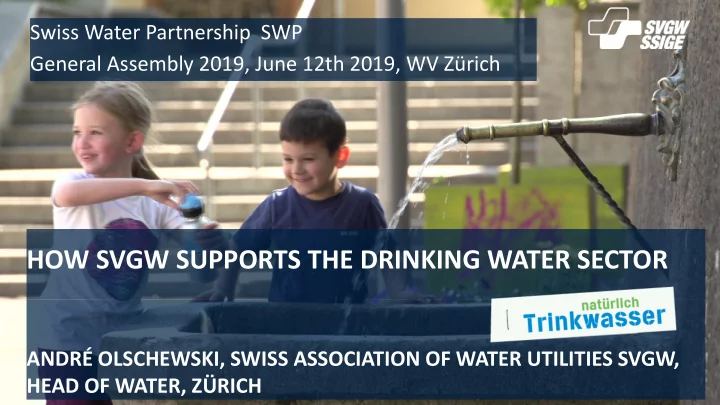

Swiss Water Partnership SWP General Assembly 2019, June 12th 2019, WV Zürich HOW SVGW SUPPORTS THE DRINKING WATER SECTOR ANDRÉ OLSCHEWSKI, SWISS ASSOCIATION OF WATER UTILITIES SVGW, HEAD OF WATER, ZÜRICH
Agenda • Who is the SVGW ? Roles, services…. • Swiss drinking water sector • Current challenges for the drinking water sector in Switzerland • International context Schweizerischer Verein des Gas- und Wasserfaches (SVGW) 2
Swiss Association of Gas- and Water Industry SVGW - representing also 530 drinking water utilities Representing 70% der 70% of Einwohner population served SVGW services in water: • safe guard of drinking water quality • Knowledge platform • Vocational training • Setting of technical rules and standards • Audits and certification • Information 3 • One voice for drinking water Schweizerischer Verein des Gas- und Wasserfaches (SVGW)
How are we organized - how do we work? Key characteristics: • > 140 years old • Gas-/Energy Supply and Water Supply • Association / Self help group • Formalized member network • Water • Drinking water: → legal basis: “Foodstuff” • Water resources: → legal basis: “Environment” Organisation and Governance: • Board • Technical steering committee • Technical working groups (voluntary) • Secretariat & working groups: around 50 pers. Schweizerischer Verein des Gas- und Wasserfaches (SVGW) 4
Who are members? How are we funded? Members: • Water supply utilities, association of water supply utilities, communities • Industry incl. Engineers and service providers • Authorities at national and cantonal level • Individuals Funding sources: • ±45% member fees • ± 50% income through services, mainly vocational training and conferences • ± 5% other income • No core funding by government Schweizerischer Verein des Gas- und Wasserfaches (SVGW) 5
Drinking water provision: Legal basis, roles and responsibilities Constitution Bundesverfassung BV System natural resources DW supply system consumer BV Art 5 / 43a: Delegation of duties ( Subsidiarity principle ): → National level to Cantons → Cantons can delegate duty e.g. for water supply to communes F A T S V BV Art 76: → cantons are owner of water bodies Commune / utility responsibility all House owner LMG/TBDV Law national GSchG LMG/TBDV → cantonal environment foodstuff foodstuff Related topic km_AnforderungWV_0301_02 6
Structure of drinking water utilities 2015 Wasserversorgungen und Wasserabgabe 2013 (hochgerechnet) Share of total No of utilities Few big and many (Annahme: Gesamtanzahl der Wasserversorgungen rund 10% höher als Anzahl Gemeinden) water provided small utilities (SVGW members) 270 1'800 1'647 240 1'600 Wasserabgabe im eigenen Versorgungsgebiet [Mio. m3] 215 210 1'400 191 Anzahl Wasserversorgungen 180 1'200 144 142 150 1'000 139 120 800 604 86 90 600 60 400 223 30 200 114 36 10 0 0 < 2000 2'000 - 4'999 5'000 - 9'999 10'000 - 19'999 20'000 - 49'999 > 50'000 Grösse der Wasserversorgung (versorgte Einwohner) Basiswissen Wasserversorgung 7
Some key figures (2015) People served: 8.3 Mio. 933 Mio. m 3 Water provided: Coverage DW: 98% (2% by «Self Supply») Average daily consumption incl. industrial sector: 300 l / cap* day Average daily consumption per cap in household 142 L / cap 1m 3 → 2.00 CHF Average costs for DW: Costs per cap in household for DW: 0.30 CHF /day Tap water : mineral water → 1: >500 Eco footprint: Basiswissen Wasserversorgung 8
Water Production About 70% of water distributed without major treatment springs pumped groundwater Surface water (treated) Basiswissen Wasserversorgung 9
Usage of drinking water Basiswissen Wasserversorgung 11
«Replacement Value» of drinking water infrastructure Replacement value CHF Basiswissen Wasserversorgung 12
Key technical and processes SVGW-Standards / Best practices Technical key components: • Catchment area and wells/springs reservoir • Water treatment • Reservoir • Mains / distribution network mains/distribution network Key processes : • Operation and maintenance • Water safety plan and quality control (HACCP) • Strategic planning and financing Treatment • Sales and accounting plant • PR and marketing • Conflict management / resolution • … Capture zone/ well Basiswissen Wasserversorgung 13
Outlook: challenges for the Swiss water supply sector • Adaptation to climate change • Regional planning and cooperation, water security • Protection of water supply resources from pollution • Professionalisation of water sector, structural and organisational changes • Sustainable financing and governance of water supply by communities • Digitalisation Basiswissen Wasserversorgung 14
«Added Value» for members www.svgw.ch/mehrwert • • Standards and best practice Networking between (“ anerkannte Regeln der practitioners, consultants, Technik”) industry and state government of different • Vocational training levels • News, exchange and • Lobbying networking • Public consultation • Awards • PR und media • Audits, Control, • insurances • Certification of products • Occupational health and safety training Basiswissen Wasserversorgung 15
Regional pattern of pesticides in groundwater e.g. Chloridazon (BAFU → NAQUA) Chloridazon: regional concentration pattern for main substance and metabolites Sugar beet /fodder beet: Schweizerischer Verein des Gas- und Wasserfaches (SVGW) 16
Pesticides in drinking water in Switzerland 70% of groundwater sampling sites with main land use farmland show concentration of pesticides or metabolites > 0.1 µg/L Atrazine detected in many water samples > 0.1 µg/L (was banned 2007 in CH) New substances detected, e.g. Chlorothalonil Unknown impact of cocktail of pesticides in ground- and drinking water Consumer and water utilities don’t want pesticides to be in drinking water! 17
Currently two relevant political initiatives for drinking water 2018 March 2019 20.6.2019 prob. May 2020 end 2020 «Drinking water initiative (TWI)» Parliament: Public Vote on TWI Agriculture counter project Consultation on and Pesticide policy AP22+ «Initiative for pesticide ban» for initiatives: Agriculture policy ban initiative defined yes or no? AP22+ Basiswissen Wasserversorgung 18
SVGW & international context Public consultation: e.g. ChemRRV Virtual Water Schweizerischer Verein des Gas- und Wasserfaches (SVGW) 19
KEEP GROUND WATER CLEAN FOR SAFE DRINKING WATER IN FUTURE André Olschewski, SVGW a.olschewski@svgw.ch Trinkwasserverband SVGW Grütlistrasse 44 Postfach 2110 8027 Zürich Tel:+41 44 288 33 33
Recommend
More recommend